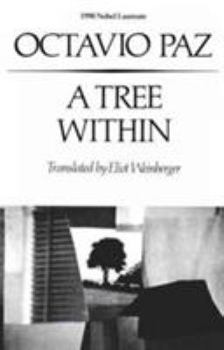A Tree Within: Poetry
A Tree Within ( Arbol Adentro ), the first collection of new poems by the great Mexican author Octavio Paz since his Return ( Vuelta ) of 1975, was originally published as the final section of The Collected Poems of Octavio Paz, 1957-1987 . Among these later poems is a series of works dedicated to such artists as Miró, Balthus, Duchamp, Rauschenberg, Tapies, Alechinsky, Monet, and Matta, as well as a number of epigrammatic and Chinese-like lyrics...
Format:Paperback
Language:English
ISBN:0811210715
ISBN13:9780811210713
Release Date:November 1988
Publisher:New Directions Publishing Corporation
Length:164 Pages
Weight:0.42 lbs.
Dimensions:0.4" x 5.2" x 8.0"
Customer Reviews
2 ratings
Exquisite Poetry in English y Espagnol
Published by Thriftbooks.com User , 23 years ago
This bilingual text enhances the experience of reading Paz's poetry. His poetic form can be as spare and suggestive as tanka/haiku or dense with visual imagery as in the poem, A Fable of Joan Miro. The meditative tone of many selections suggests that beyond the accomplishments of art, literature and music, the essential composition is of oneself: "to learn to see so that things will see us and come and go through our seeing." Highly recommended.
A stunning achievement by a giant of 20th century poetry
Published by Thriftbooks.com User , 23 years ago
Octavio Paz wrote some of the most remarkable poetry and prose of the 20th century. The collection of poems entitled "A Tree Within" represents one of his most memorable achievements. A remarkable diverse blend of short lyrics and longer, Whitmanesque creations, "A Tree Within" is definitely a collection that bears careful reading and re-reading.The book is richly studded with multicultural references and allusions--to Epictetus, Buddha, Gilgamesh, Jack the Ripper, the Aztecs, Don Quixote, and many, many, more. But Paz is not merely trying to dazzle us with his knowledge. He is also introspective and revealing. He struggles with deep questions about language, love, and other concerns. Paz seems to be searching both for an ideal poetic language, and for a form of connectedness that transcends language--a paradoxical quest, yet pure Paz. When he writes "Man's word / is the daughter of death" (in the poem "To Talk"), it strikes me as both a tragically naked confession of inadequacy and a moment of serene liberation. At other times, Paz seems, like Walt Whitman and Emily Dickinson, to be groping towards the creation of a sort of "secular scripture" for the (post)modern age.In the poem "I Speak of the City," Paz writes, "I speak of our public history, and of our secret history, yours and mine." The histories recorded by this visionary genius are certainly some of the most important literary creations of the 20th century.





